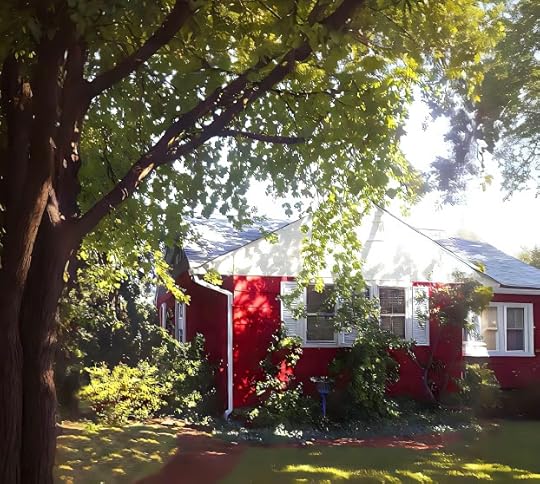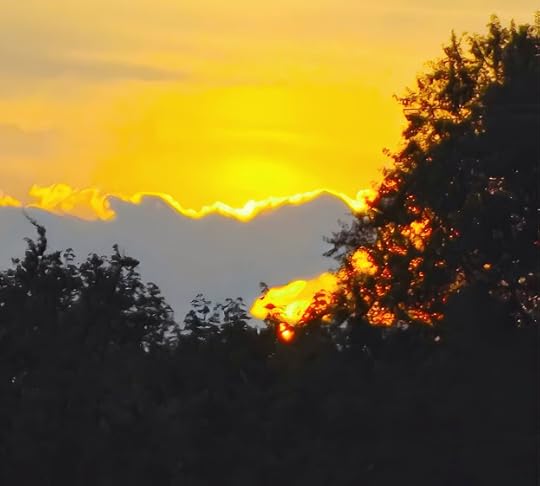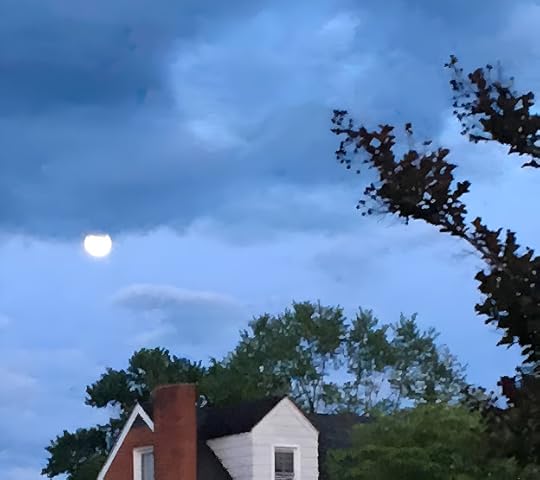John Janaro's Blog, page 3
August 28, 2025
Saint Augustine and “The Hundredfold”
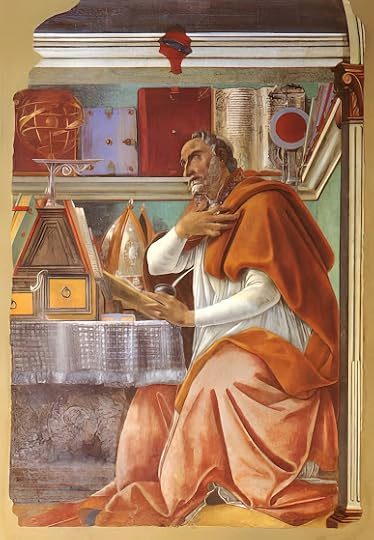 Saint Augustine. There's no end to what we could say about him. I want to refer to one of the many things about him that has always fascinated me. Saint Augustine is a radiant example of what Jesus calls "the hundredfold" (Mark 10:31).
Saint Augustine. There's no end to what we could say about him. I want to refer to one of the many things about him that has always fascinated me. Saint Augustine is a radiant example of what Jesus calls "the hundredfold" (Mark 10:31).Jesus says that if we follow Him, we will receive eternal life...but also, we will receive a hundredfold in this life (along with "persecutions"). He also says "seek first the Kingdom of God, and all these things will be added as well" (see Matthew 6:33). What exactly does Jesus mean here? He does not mean the we should follow Him in order to get stuff in this life. That would be to reduce Jesus to our own measure. Jesus wants to transform us according to God's wisdom. He wants to give us a new mind and a new heart. He promises eternal life, which is the free gift of participation in the life of God. God is the Mystery toward which everything in this life points, and His love is therefore the real meaning of everything in this life.
For this very reason, eternal life “already” illuminates our present historical life beyond our limited measure. The Servant of God Msgr. Luigi Giussani often said something that resonates deeply with me, and corresponds to my own experience. He said that if you really follow Christ, you will also discover that you love your wife a hundred times more than you ever could have imagined; that you love your children a hundred times more, your work a hundred times more, your friends a hundred times more. You will discover the real greatness of this life, and you will even be able to embrace suffering.
There is a particular way in which Saint Augustine's life indicates this pattern. Here was a man who aspired to be a great rhetorician, an artist with words. He pursued this ambition with relentless passion, but without understanding its true value. And then he found Christ, and he gave up all thought of being a rhetorician. He gave up the desire to be known for his speeches and writings and works in this world. He longed for Christ, followed Christ, and kept his heart fixed on Christ.
And from out of his singular passion for Christ — without even thinking about it, or caring, or noticing it — he wrote an amazing book. Desiring only to praise Christ, he wrote a book that was not only the greatest book of its epoch, but one of the greatest ever written in human history. In His Confessions, Saint Augustine gave the world inimitable and unforgettable Latin prose, soaring and poetic diction, and timeless, soul-penetrating insight into the heart of the human being.
Aurelius Augustinus the rhetorician and scholar, had he followed his ambition, might have become a teacher with some following, or even perhaps a minor provincial statesman of his period. Students of late antiquity might have known his name even today. But Saint Augustine, by following Christ, became also “a hundred times more” in the history of this world. He wrote books that speak to every time and in every language, and he gave us words that ring out through the ages — words that rival any that have ever been uttered in human speech.
There is something of the hundredfold here, although it has been more for our benefit than for his."Late have I loved you, O Beauty ever ancient, ever new, late have I loved you! You were within me, but I was outside, and it was there that I searched for you. In my unloveliness I plunged into the lovely things which you created. You were with me, but I was not with you. Created things kept me from you; yet if they had not been in you they would have not been at all. You called, you shouted, and you broke through my deafness. You flashed, you shone, and you dispelled my blindness. You breathed your fragrance on me; I drew in breath and now I pant for you. I have tasted you, now I hunger and thirst for more. You touched me, and I burned for your peace" (Confessions X:27).
August 25, 2025
Happiness: Only For “People in Power”?
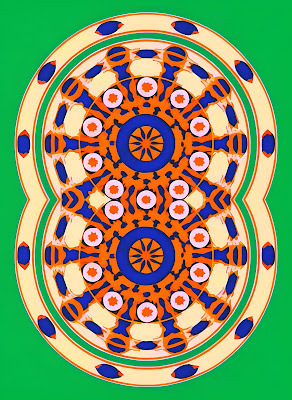 What is “happiness”?
What is “happiness”? We live in a society that claims that the "real world" is confined to its material elements, and that the ultimate arbiter of rational human interest is empirical science.
Everything that appears to be outside of these confines belongs to the realm of dreams or delusions, or at best to matters undefinable, or completely relative to the psychological needs, personal “goals,” desires, wishes, and fantasies of different people.
Of course, we want to affirm the value of ideals like “happiness” (as well as “goodness,” “honor,” “fidelity,” and the other words we use to signify the aspirations we seem to “care about” most in life). Isn’t this what “freedom” is all about? Aren’t we “free to choose” what makes up our happiness? And then, aren’t we “free to choose” different (even opposing) ways of happiness tomorrow, without answering to any authority beyond our own judgment? “I do me” and “you do you” and everything’s fine… as long as you don’t break the law….
So why are we all so anxious, overwhelmed, and… unhappy?
If happiness is confined materialistic laws and subjective experiments in self-identification, irrational urges, or the whims of the moment, then life is very burdensome indeed for most of us. Human freedom, it turns out, is a very fragile thing in this world. The chance for happiness seems reserved to those who have power - while the rest of us just have to shuffle along as best we can in this limited existence.
Wait, that can’t be right! The human heart cries out against this ultimate cynicism and discouragement. There must be something “more”… but where can we find it? Must we depend on the scraps that fall from the tables of the powerful?
Here, serious attention to the real human question "what is happiness?" becomes almost “subversive.” The need for happiness, if we confront it truly, will take us beyond this world, beyond everything, toward an Infinite Mystery which is the only reality that truly corresponds to our hearts. It is a religious question, and human cultures throughout history - regardless of how they have attempted to answer it - have always recognized its religious nature.
But if we really believe that there is nothing meaningful for human life beyond this world and our capacity to manipulate it, then the need for ultimate happiness is desperate, unsettling, even pathological.
It is therefore something to be suppressed. We must not ask this question. We must distract ourselves from it, even though it permeates our being. We must live our lives on the shallow surface of every experience.
The truly religious person, however, is someone who is at least seeking the answer. And the Christian claims that the Answer has come into the world, and is seeking us.
This is a basic reason why Christian faith doesn't make any sense to people in our society. This is why people can't understand why it matters to believers. Indeed, this is why many Christians themselves don't understand the place of faith in their own lives.
We have been conditioned to evade ourselves, to suffocate our hearts, to flee from the deep cry within us that cannot be satisfied by anything in this finite world. And this evasion has become a forgetfulness. We have cheapened and falsified all the terms associated with the question of happiness: love, justice, goodness, truth, beauty, freedom. We no longer remember how to ask the question.
No wonder the Christian proposal makes no sense. Luigi Giussani often cites Reinhold Niebuhr's insight: “Nothing is more incomprehensible than the answer to a question that has never been asked.”
There is, of course, still another possibility. There is the possibility of meeting some real people who have actually begun to be happy. The human person might wake up, remember their heart, and discover that they have been controlled by lies.
Nothing is more subversive to the dominant powers of this world than happy people.August 22, 2025
Prayer for Peace and the Queen of Peace
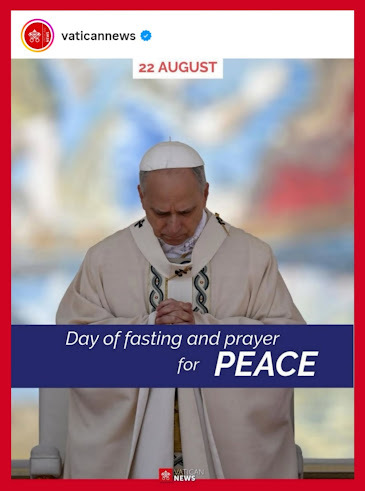 Pope Leo XIV has invited us to observe today (Friday, August 22) as a day of fasting and prayer for peace. Today is the “Octave” of the feast of the Assumption, which is appropriately celebrated as the feast of the “Queenship of Mary.” She has taken her place in fullness of the glory of the New Creation, by virtue of the singular grace of her Son who preserved her from original sin and all personal sin in order to associate her in a unique way in the history of the redemption of the world. Mary’s stature is entirely the fruit of the saving love of her Son Jesus; her free cooperation with the obedience of Jesus to the Father is itself the gift and fruit of His grace and entirely dependent on His grace. In turn, we might say that her maternal love for the world and for each one of us is an “intrinsic” (and especially beautiful) facet of the grace He gives us as He leads us on the path to our destiny in God’s Kingdom. Mary is our Mother, and through her maternal mediation we are formed in the whole of our humanity as His brothers and sisters.
Pope Leo XIV has invited us to observe today (Friday, August 22) as a day of fasting and prayer for peace. Today is the “Octave” of the feast of the Assumption, which is appropriately celebrated as the feast of the “Queenship of Mary.” She has taken her place in fullness of the glory of the New Creation, by virtue of the singular grace of her Son who preserved her from original sin and all personal sin in order to associate her in a unique way in the history of the redemption of the world. Mary’s stature is entirely the fruit of the saving love of her Son Jesus; her free cooperation with the obedience of Jesus to the Father is itself the gift and fruit of His grace and entirely dependent on His grace. In turn, we might say that her maternal love for the world and for each one of us is an “intrinsic” (and especially beautiful) facet of the grace He gives us as He leads us on the path to our destiny in God’s Kingdom. Mary is our Mother, and through her maternal mediation we are formed in the whole of our humanity as His brothers and sisters.It is a great consolation to remember that she is our Mother, especially in these times in which we live. As members of a materially wealthy and spiritually impoverished society — in a world of so much confusion, so much danger, so much suffering — we find it increasingly difficult to distract ourselves from the desperate circumstances of the moment and the unknown future that looms before us. We are living on the edge of chaos, with war so much closer that we realize, and with political leadership that gives little evidence of wisdom (and all too much evidence of foolishness).
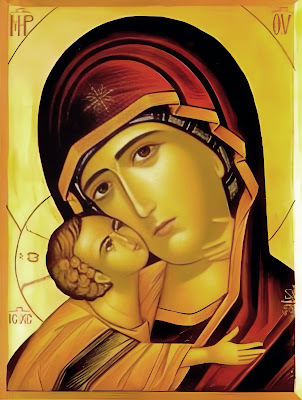
It is ultimately a blessing to be drawn up so close to the crisis, in that our hearts are shaken and we must recognize our need for Someone greater than our hearts, to whom we can turn and cry out for the wisdom we cannot give ourselves, the path forward we cannot see, the tasks and the endurance we are called to in these days, in the face of turmoil beyond our understanding (but not beyond the goodness and mercy of the One who sustains us and draws us to Himself). It is a special consolation to know in these times the closeness of Mother Mary and the tenderness of her maternal love that remembers everyone, and mysteriously accompanies us even in the darkest and most terrifying moments, when we feel most alone and defenseless. She carries us into the Heart of her Son, Jesus.
For some of our brothers and sisters, the particular nightmare of open war or other degrading forms of violence is already a dreadful daily experience. We pray especially for them today, and we fast — we freely make sacrifices that create space within our bodily persons to remember God, and to draw closer in solidarity to our suffering brothers and sisters.August 20, 2025
Saint Bernard: “Invoke the Name of Jesus”
“Are you troubled? Think but of Jesus, speak but the name of Jesus, the clouds disperse, and peace descends anew from heaven. Have you fallen into sin? So that you fear death? invoke the name of Jesus, and you will soon feel life returning. No obduracy of the soul, no weakness, no coldness of heart can resist this holy name; there is no heart which will not soften and open in tears at this holy name.”
~Saint Bernard of Clairvaux (1090-1153)

August 18, 2025
More “Artful August” Scenes
It’s been a wet August, though not especially hot. Here are a bunch of “scenes” that I have worked up with digital art tools in recent weeks. AI is everywhere in the pictorial realm these days, including my own “studios.” Nevertheless, making pictures like these — that begin from real photographs — still requires more “hands-on” work than one might expect.
The horizon of the Blue Ridge in the Shenandoah Valley continues to provide a foundation for most of the scenery I try to create, along with seasonal flowers, creeks, fields, etc. These are various styles:

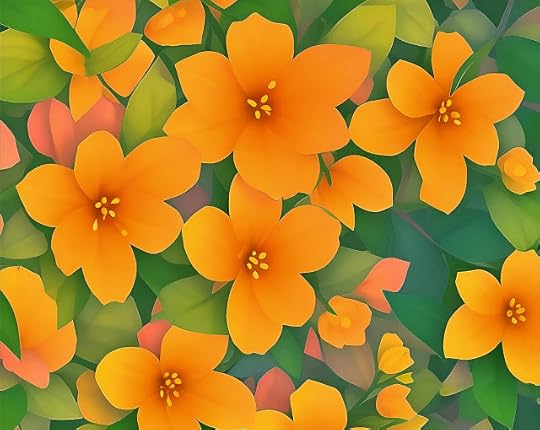


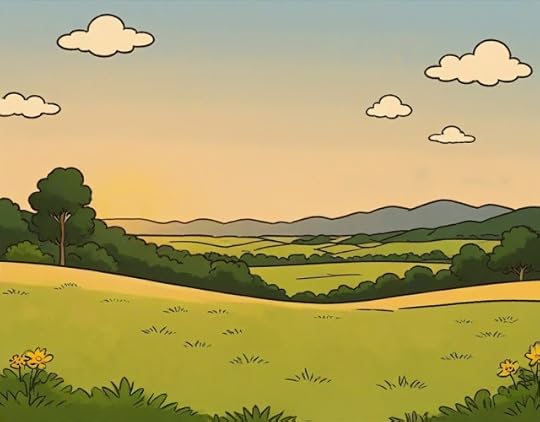
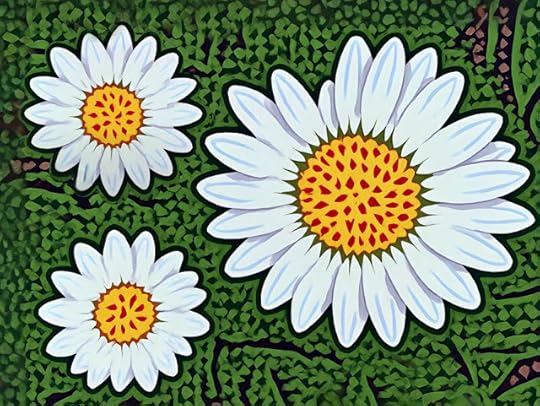



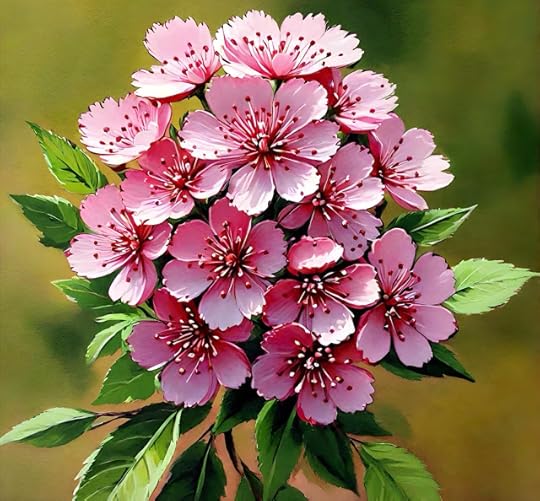
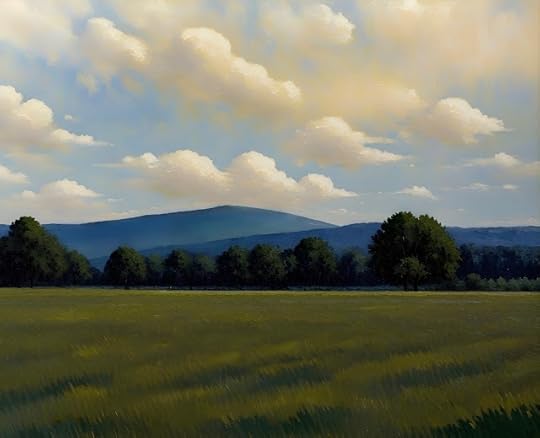




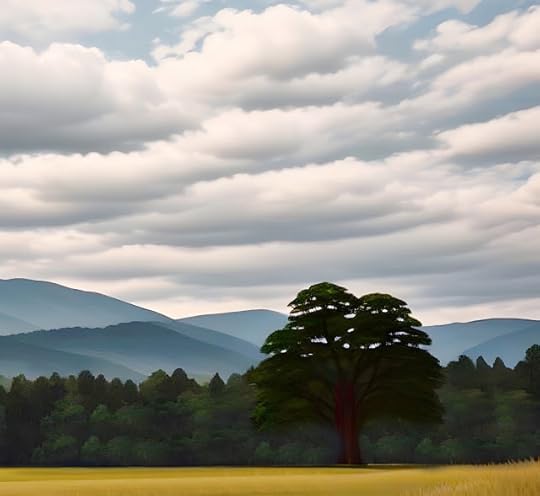
August 17, 2025
"Allow the Poor to Enter..."
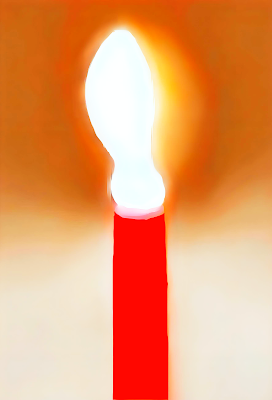 "Only together, only by becoming a single Body in which even the most fragile participate with full dignity, are we the Body of Christ, the Church of God. This happens when the fire that Jesus came to bring burns away the prejudices, cautions, and fears that still marginalize those who bear the poverty of Christ written in their history. Let us not exclude the Lord from our churches, our homes, and our lives. Let us instead allow the poor to enter, and then we will also make peace with our own poverty, the poverty we fear and deny when we seek tranquility and security at all costs" (Pope Leo XIV).
"Only together, only by becoming a single Body in which even the most fragile participate with full dignity, are we the Body of Christ, the Church of God. This happens when the fire that Jesus came to bring burns away the prejudices, cautions, and fears that still marginalize those who bear the poverty of Christ written in their history. Let us not exclude the Lord from our churches, our homes, and our lives. Let us instead allow the poor to enter, and then we will also make peace with our own poverty, the poverty we fear and deny when we seek tranquility and security at all costs" (Pope Leo XIV).
August 15, 2025
The Witness of Mary, and the Church's Enduring Fruitfulness
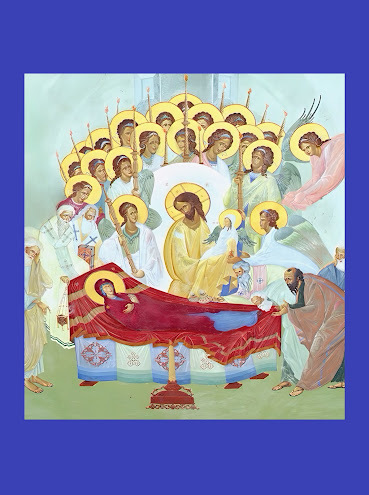 Here is a selection from Pope Leo's homily on the Solemnity of the Assumption of the Blessed Virgin Mary. Nothing I write could come close to the depth of this meditation. So I present a selection from his homily for today (thanks to Vatican Media). The Pope emphasizes that the Assumption — the triumphant fulfillment of Mary's life — is linked to the prayer she gave us in her encounter with Elizabeth while Jesus was yet in her womb. Mary's glorification, soul and body, fulfills the union with Jesus that she lived every moment of her historical life. When we live through faith in Jesus and love for one another, the hope of the resurrection and the promise of God's kingdom begins to transform our lives here and now, and thereby changes our world in which we journey toward the definitive realization of God's kingdom. His glory is manifest in the love and mercy that bring forth new ways of living, and in the light it shines on the meaning of everything in history. Pope Leo emphasizes that "the Resurrection enters our world even today... Prior to being our final destiny, the Resurrection transforms — in soul and body — our dwelling on earth. Mary’s song, Magnificat, strengthens the hope of the humble, the hungry, the faithful servants of God."
Here is a selection from Pope Leo's homily on the Solemnity of the Assumption of the Blessed Virgin Mary. Nothing I write could come close to the depth of this meditation. So I present a selection from his homily for today (thanks to Vatican Media). The Pope emphasizes that the Assumption — the triumphant fulfillment of Mary's life — is linked to the prayer she gave us in her encounter with Elizabeth while Jesus was yet in her womb. Mary's glorification, soul and body, fulfills the union with Jesus that she lived every moment of her historical life. When we live through faith in Jesus and love for one another, the hope of the resurrection and the promise of God's kingdom begins to transform our lives here and now, and thereby changes our world in which we journey toward the definitive realization of God's kingdom. His glory is manifest in the love and mercy that bring forth new ways of living, and in the light it shines on the meaning of everything in history. Pope Leo emphasizes that "the Resurrection enters our world even today... Prior to being our final destiny, the Resurrection transforms — in soul and body — our dwelling on earth. Mary’s song, Magnificat, strengthens the hope of the humble, the hungry, the faithful servants of God." After three months, the worldly "novelty" of a "new Pope" has mostly worn off. The various platforms of secular media shift their preoccupations faster than ever. Indeed, this is a time in history in which it's easy to be "anxious and worried about many things." Our soft-spoken Anglo-American-Hispanic-Peruvian Pope doesn't stir up many headlines, but let us not forget to attend to the spiritual (Spirit-filled) profundity of his teaching. He continually recalls our hearts to the "memory" of Christ the Redeemer and the fruitfulness of our adherence to Him.
Here is a rich selection from Pope Leo's beautiful homily for today:
"The liturgy of this feast of the Assumption offers us the Gospel passage on the Visitation. Saint Luke recorded in this passage a decisive moment in Mary’s vocation. It is beautiful to recall that day, as we celebrate the crowning moment of her life. Every human story, even that of the Mother of God, is brief on this earth and comes to an end. Yet nothing is lost. When a life ends, its uniqueness shines even more clearly. The Magnificat, which the Gospel places on the lips of the young Mary, now radiates the light of all her days.
"The Resurrection enters our world even today. The words and choices of death may seem to prevail, but the life of God breaks through our despair through concrete experiences of fraternity and new gestures of solidarity. Prior to being our final destiny, the Resurrection transforms — in soul and body — our dwelling on earth. Mary’s song, Magnificat, strengthens the hope of the humble, the hungry, the faithful servants of God. These are the men and women of the Beatitudes who, even in tribulation, already see the invisible: the mighty cast down from their thrones, the rich sent away empty, the promises of God fulfilled. Such experiences should be found in every Christian community. They may seem impossible, but God’s Word continues to be brought to light. When bonds are born, with which we confront evil with good and death with life, we see that nothing is impossible with God (cf. Luke 1:37).
"Sometimes, unfortunately, where human self-reliance prevails, where material comfort and a certain complacency dull the conscience, this faith can grow old. Then death enters in the form of resignation and complaint, of nostalgia and fear. Instead of letting the old world pass away, one clings to it still, seeking the help of the rich and powerful, which often comes with contempt for the poor and lowly. The Church, however, lives in her fragile members, and she is renewed by their Magnificat. Even in our own day, the poor and persecuted Christian communities, the witnesses of tenderness and forgiveness in places of conflict, and the peacemakers and bridge-builders in a broken world, are the joy of the Church. They are her enduring fruitfulness, the first fruits of the Kingdom to come. Many of them are women, like the elderly Elizabeth and the young Mary — Paschal women, apostles of the Resurrection. Let us be converted by their witness!"
August 14, 2025
Maximilian Kolbe, Praising God, and Serving Our Neighbors
Today is the feast of Saint Maximilian Kolbe. He taught us to praise and love God always, to conquer indifference, to give ourselves in loving service to our neighbors, to follow Jesus through Mary in the Church.
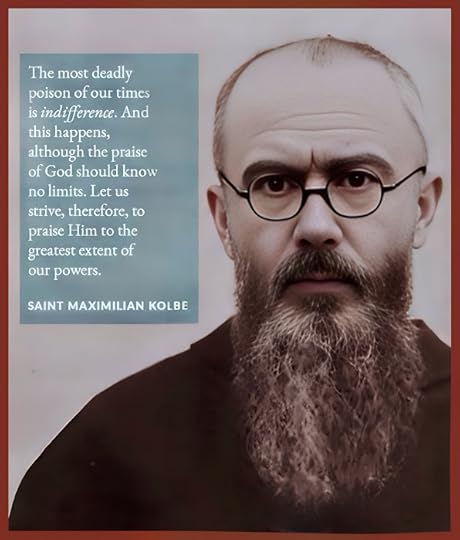
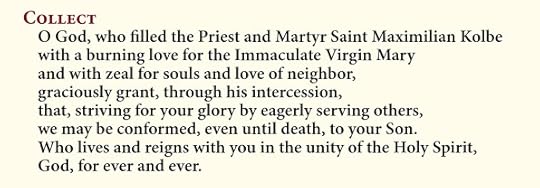
August 11, 2025
Economy and the “Inexhaustible Treasure”
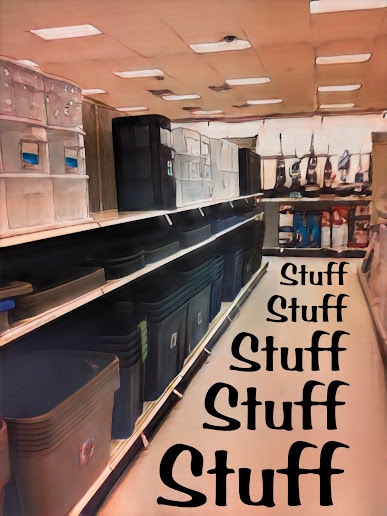 Jesus said to his disciples: “Do not be afraid any longer, little flock, for your Father is pleased to give you the kingdom. Sell your belongings and give alms. Provide money bags for yourselves that do not wear out, an inexhaustible treasure in heaven that no thief can reach nor moth destroy. For where your treasure is, there also will your heart be" (Luke 12:32-35).
Jesus said to his disciples: “Do not be afraid any longer, little flock, for your Father is pleased to give you the kingdom. Sell your belongings and give alms. Provide money bags for yourselves that do not wear out, an inexhaustible treasure in heaven that no thief can reach nor moth destroy. For where your treasure is, there also will your heart be" (Luke 12:32-35).Where is our "treasure"?
We live in a society that worships money.
Money has a place in life, as a medium of exchange and a symbol of the material value of our work (which is not the whole value of the personal self-giving action that constitutes human work). We earn money because our work, our personal effort to invest ourselves and participate in building up a human environment, manifests and communicates our transcendent human dignity and inestimable value as unique, free human persons, even if we perform the humblest of tasks.
Workers cannot be bought, as if they were nothing more than material tools along with other “things” in the industrial production process. They are persons who contribute themselves, through their work, to a production project. For this they have a claim on the owners to be just (and further, to be equitable and charitable), They have a claim to be respected, treated with dignity, and given the means to take care of themselves and their families. Money enters in here, as a “medium of exchange” that is not just “transactional” but that represents — in part — the recognition of a common human bond, a sense of solidarity among all the persons involved in realizing the task that has been undertaken. The “wage” should be just, remembering that “justice” is a foundation for relationships with persons. A true “just wage” is not only materially adequate. It should be given as a sign of the owner’s appreciation of the persons with whom he or she is working together to realize a project.
Some workers are more personally invested than others. “Equality,” therefore, is naturally proportional: the point is not the “everyone gets the exact same paymen” (which, ironically, would reduce human work to a mere function, a thing that is “bought”). The just wage instead, is one way the employer prioritizes the personal value of the worker and his or her family. It serves the workers’ right to live and flourish by making it possible for them to obtain the material necessities of this life and some of its comforts as well, and also to save and eventually invest in their own property, to acquire “ownership” — concrete stewardship over a stable “place” with its own resources, where the worker is free to develop his or her own creativity. Here we see (I hope) some elements of what a person-centered economy might look like.
Money also enables people to help one another, and also support institutions that enrich their hearts, minds, and souls in literally priceless ways (consider their fundamental connection to their churches, that must be supported in order to carry out their ministry). These institutions still require food, water, electricity, repairs, and the resources to take care of their own employees. Everyone has material needs and can benefit from some of the comforts that reinvigorate life. This is all legitimate, and makes money necessary in society.
But a human culture is spoiled when material things are ripped from the place where they contribute to an integral human life, and are used to measure the value of human persons. We all need “things” to meet our own essential material needs, but something is wrong if those needs preoccupy us, cause us to worry, or loom over us pretending to be the limits of the meaning of human existence. "Humans do not live on bread alone." Food, possessions, success, wealth are not the meaning of life. Still, even though our life is a journey toward a transcendent fulfillment beyond what we can imagine, we are journeying as bodily persons living on this earth, and so we need sustenance for our pilgrimage.
We need some comforts too, which can help us live as bodily persons with a greater energy and scope. We need to rest, relax sometimes, and to have spaces of tranquility, for the growth of our families, and for hospitality. These are modest comforts that provide space for a healthier, more expansive, more magnanimous life: a life worthy of human dignity. Nevertheless, it is a life that "moves" toward God's kingdom. There is a problem when — instead of seeking reasonable comforts and useful things for the sake of living with an attention to our humanity, searching for truth and goodness, living generously and sharing with our companions on this journey toward the Inexhaustible Treasure — we find ourselves living for the sake of acquiring ever greater comforts and luxuries, and ever more sophisticated technological and other devices beyond the practical paths opened up here and now for ours or anyone else's human development.
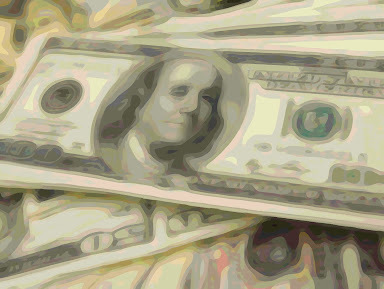 If we live to acquire stuff, and we make these (ultimately limited) "riches" the measure of what it means to live, we will be ultimately disappointed. No security system can protect our superfluous stuff from the reach of the most subtle of all thieves: time. What we once thought was so precious about the things we bought fades or becomes useless or, eventually, boring. Boredom is the “moth” that inevitably destroys finite things for persons who seek from them the infinite satisfaction for which our hearts were made. But the world of consumerism fills our ears with lies and distracts us with false promises. So we throw away our old things and buy new things; then, eventually, we throw them away too. We become our own thieves, stealing from ourselves, stealing away the possibilities for a great life in which every day is a sign that draws us toward eternal fulfillment, toward the Kingdom that God ardently longs to give to His children. But we live in distraction, grasping blindly at the edges of things, desperate and dissatisfied. We rely on our own strength and measure, and the experience of our own inadequacy makes us afraid. This is what a materialistic consumer economy looks like.
If we live to acquire stuff, and we make these (ultimately limited) "riches" the measure of what it means to live, we will be ultimately disappointed. No security system can protect our superfluous stuff from the reach of the most subtle of all thieves: time. What we once thought was so precious about the things we bought fades or becomes useless or, eventually, boring. Boredom is the “moth” that inevitably destroys finite things for persons who seek from them the infinite satisfaction for which our hearts were made. But the world of consumerism fills our ears with lies and distracts us with false promises. So we throw away our old things and buy new things; then, eventually, we throw them away too. We become our own thieves, stealing from ourselves, stealing away the possibilities for a great life in which every day is a sign that draws us toward eternal fulfillment, toward the Kingdom that God ardently longs to give to His children. But we live in distraction, grasping blindly at the edges of things, desperate and dissatisfied. We rely on our own strength and measure, and the experience of our own inadequacy makes us afraid. This is what a materialistic consumer economy looks like.But Jesus says, “Do not be afraid.” God loves us. He has created us to share forever in His Infinite Glory. He has made us for Himself, and He wants to give Himself to us. Let us place out hope in Him, and “make room” in our hearts for the Kingdom He is pleased to bestow upon us.
August 10, 2025
August Scenes
Here is some digital artwork for the month of August.
It seems that a "Fall" semester begins in a couple of weeks. But August 2025 still feels like Summer, with heat, humidity, and thunderstorms. And still quite a bit of sunlight into the evening.

